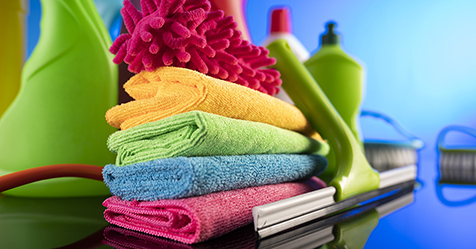In recent years several reports have come out investigating how the work environment is changing and how the evolving workplace will impact the cleaning of office buildings. Primarily, these changes revolve around how the traditional workspace—one person, one office—is disappearing and being replaced by an open office setting.
But this isn’t the only way in which changes are happening, especially in areas such as Silicon Valley, where pets in the workplace are becoming commonplace. More and more workers are bringing their dogs to work with them, and employers are allowing it. For example, in a 2017 study by Banfield Pet Hospital, seven-in-10 employees and human resources decision-makers said “allowing pets in the workplace has a positive impact on employees.” And companies like Amazon and Bissel that have a stake in the cleaning industry even have special dog-friendly areas in their headquarters offices.
However, while studies suggest the presence of dogs in the workplace can have positive effects on employees, worker satisfaction, and collaboration among colleagues, the impact of a pet-friendly environment can also invite more responsibility for facility managers, building service contractors, and custodial teams.
Policies Before Pets
Many facility managers already know cleaning and maintaining open space offices can be much different—and more involved—than cleaning traditional offices. “Cleaning needs are often amplified,” says Roland Strick, Jr., president of Service by Medallion, which cleans corporate facilities throughout Silicon Valley and the San Francisco Bay Area in California. “This is because more people are using the same space; more areas must be detail cleaned and disinfected; and disease can spread much faster in an open office.”
Strick says adding dogs to the workplace can make cleaning all the more complicated. However, facility managers can help cleaning workers considerably by establishing office policies regarding dogs in the workplace.
Strick suggests managers adhere to the following to make sure they are ready to handle the extra responsibility:
- Signage or written rules: Facility managers should provide signage, communicating the responsibilities of dog owners.
- Respect for allergies: Managers must ask if other workers have allergic reactions to dogs or pets in general; if so, pets should not be allowed.
- Insurance: Managers should check whether current insurance policies cover dogs in the office; otherwise, the dog owner may need to carry special insurance.
- Dog-free zones: Managers should indicate areas where dogs are not allowed, such as areas housing sensitive equipment, food service areas, or kitchens.
- Proper cleaning tools: Tools should be provided to help clean up accidents; these could include spill pads, designed to absorb liquids and vomiting incidents.
Pet Owner Policies
Strict also suggests management implement the following policies for employees who are bringing dogs to work:
- Owner accountability: The dog owner must be 100% responsible for the dog’s well-being, behavior, and biological needs in the office.
- Pet obedience: Dogs should be obedient, potty-trained, and demonstrate good temperament.
- Pet health: Dogs must be up to date on vaccinations, free of parasites, clean and odor-free, and at least 12 months old.
- Waste management: Dog owners must clean up after their dogs, inside and outside the facility; waste must be disposed of in plastic bags; and if accidents occur in the office, this must be reported to cleaning professionals.
“This last point is critical,” Strick says. “Office staff may clean up an incident with household-type cleaners, but they must turn over more effective cleaning and disinfecting to the custodial workers. This is why [cleaning workers] need to know if and where an accident has happened.”
Complicating Cleaning
As we have already referenced, adding four-legged office mates to the workplace may further complicate cleaning, not only in open-space offices, but in all types of offices. “Carpet is the first concern,” Strick says. “We advise facility managers to only carpet those areas in an open office that need to be used for quiet activities or conferences. All other areas should have hard-surface floors.” This is because they are easier to clean, disinfect, and deodorize.”
“My best advice when it comes to allowing dogs or any pets in the workplace is that facility managers and cleaning professionals try it before making a commitment to such a policy,” Strick says. “It can work perfectly, or unexpected problems can come up. You can only tell by experimenting first.”




